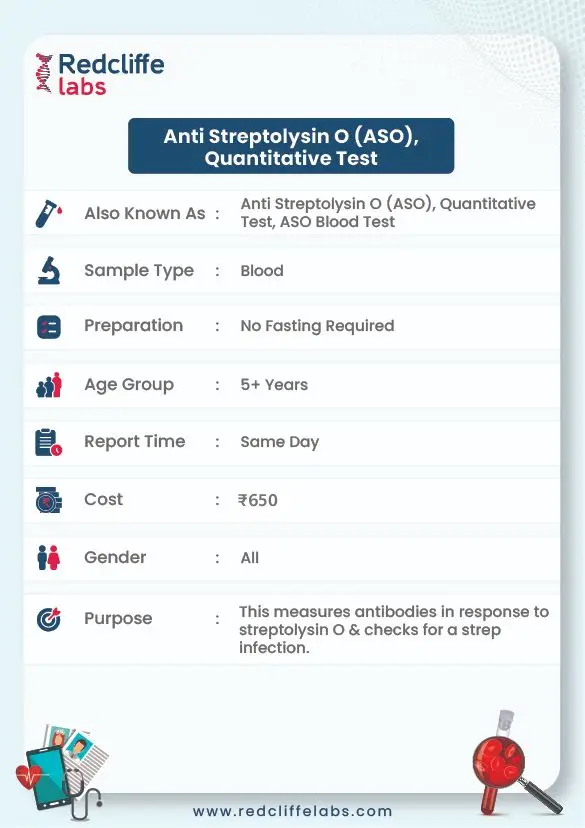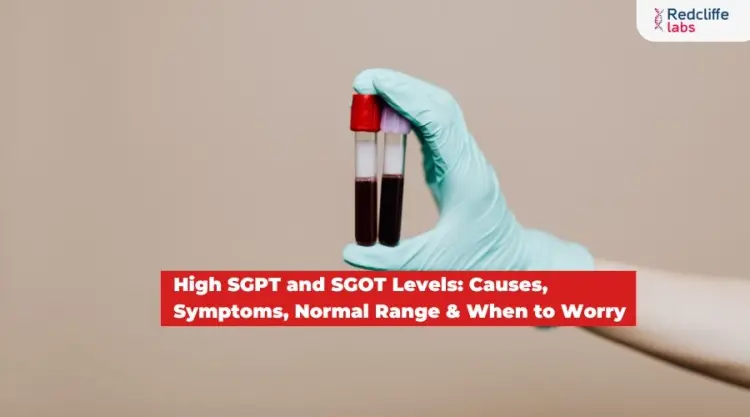Blood
Unlock special
discount on
this package
Login to Unlock 🔓
NABL Accredited lab*

Booking Benefits Unlocked Worth FREE 799

Report Consultation

Diet Plan
*Available once your report is generated.
At Redcliffe Labs, we have a single goal: to give India its right to quality diagnostics.
Customers served
Tests Processed Everyday
Cities
Collection Centres
World Class In-house Labs
Home Collection Experts
1 Test Parameters
Anti Streptolysin O (ASO), Quantitative
1 PARAMETER INCLUDED
1 PARAMETER INCLUDED
- Anti Streptolysin O (ASO)
Top Booked Health Checkup Packages
Reports in 12 hours
|Parameters 94
Reports in 12 hours
|Parameters 89
Reports in 12 hours
|Parameters 96
Reports in 12 hours
|Parameters 96
Reports in 12 hours
|Parameters 90
Verified by Medical Expert

MEDICALLY REVIEWED BY
Dr. Himani Pandey

WRITTEN BY
Anjali Dubey
Table of Content
Introduction to ASO Test
ASO test, full form, stands for "Antistreptolysin O." It is a blood test that measures the level of antibodies called antistreptolysin O antibodies. The immune system produces these antibodies in response to a streptococcal infection, particularly caused by group A Streptococcus bacteria.
ASO test is used to diagnose a current or recent streptococcal infection, such as strep throat. When a person is infected with group A Streptococcus bacteria, their immune system produces antistreptolysin O antibodies to help fight the infection. The level of these antibodies in the blood tends to rise a few weeks after the infection and then slowly decline. It may cause symptoms like strep throat, scarlet fever, skin infections like impetigo, cellulitis, and necrotizing fasciitis, as well as more severe conditions like toxic shock syndrome, rheumatic fever, and post-streptococcal glomerulonephritis. Your doctor might recommend the Antistreptolysin test to diagnose these symptoms. You can take the ASO blood test from Redcliffe Labs, which provides the best diagnostic services at reasonable prices. We offer doorstep home collection services. You need to book your ASO test, and our professional phlebotomist will come to your place to collect the sample.
Test details in brief
|
Also Known As |
Anti Streptolysin O (ASO), Quantitative Test, ASO Blood Test |
|
Purpose |
This measures antibodies in response to streptolysin O & checks for a strep infection. |
|
Preparation |
Do not take any over-the-counter medicine without confirming with your Doctor. |
|
Fasting |
No Fasting Required |
|
Get Reports Within |
Within 15 hours |
|
ASO Test Cost |
INR 650 |

Purpose of the ASO test
The purpose of the ASO (Antistreptolysin O) test is to:
- Diagnosing Strep Infections: It helps confirm the presence of a recent or ongoing group A Streptococcus infection, particularly in cases of strep throat.
- Monitoring Treatment: Doctors use the Antistreptolysin test to check if antibiotics effectively treat streptococcal infections.
- Identifying Complications: Elevated ASO antibody levels can indicate complications like rheumatic fever or glomerulonephritis, allowing for early detection and intervention.
- Ruling Out Other Conditions: The antistreptolysin test can help rule out other causes of symptoms similar to streptococcal infections.
- Clinical Assessment: In conjunction with symptoms and other tests, it aids in diagnosing and managing streptococcal-related health issues.
- Identify complications: High levels of ASO antibodies can sometimes be associated with complications of streptococcal infections, such as rheumatic fever or glomerulonephritis.
Symptoms Caused by Streptococcus Bacteria
The Streptococcus bacteria may cause symptoms like:
- Strep Throat: This is a common infection that causes sore throat, difficulty swallowing, fever, and often swollen tonsils with white patches.
- Scarlet Fever: This causes red rash, high fever, sore throat, and a "strawberry" tongue.
- Impetigo: This causes contagious skin infection that results in red sores or blisters, which can burst and develop a yellowish crust.
- Necrotizing Fasciitis: This is a severe and rare condition often referred to as the "flesh-eating bacteria" infection. It involves bacteria's rapid and destructive spread through the deep layers of skin and soft tissue.
- Streptococcal Toxic Shock Syndrome (STSS): This is a rare but serious condition where the bacteria release toxins into the blood, leading to symptoms such as fever, shock, and organ failure.
- Rheumatic Fever: This autoimmune inflammatory disease can follow a streptococcal throat infection. It can affect the heart, joints, skin, and brain and may cause symptoms such as joint pain, fever, and heart problems.
- Post-Streptococcal Glomerulonephritis: This is an inflammatory kidney disease that can occur after a streptococcal throat or skin infection. It can lead to symptoms like dark urine, swelling, and high blood pressure.
- Sinusitis: Group A Streptococcus can cause sinus infections, leading to symptoms like facial pain, nasal congestion, and fever.
- Ear Infections: It may also cause ear infections, resulting in ear pain and fever.
- Streptococcal Pneumonia: Although less common than other causes of pneumonia, Group A Streptococcus can lead to respiratory symptoms, such as cough, difficulty breathing, and chest pain.
Other common symptoms include:
- Fever
- Join swelling and pain
- Small, painless nodules under the skin
- Rapid, jerky movements (Sydenham's Chorea)
- Skin Rash
- Fatigue
- Bloody Urine
- High blood pressure
Why Do I Need an ASO Test?
The test helps to diagnose the current or recent strep infection that may cause health problems. The strep infection antibodies increase in 1 week after a strep infection. It may get higher for several weeks. ASO titers remain elevated after a streptococcal infection, even after the symptoms. By measuring ASO levels, healthcare providers can assess whether a patient has had a recent streptococcal infection, even if the infection occurred weeks or months ago.
Preparation for the ASO Test
The test does not require any special preparations or fasting. It's a simple blood test. However, here are some general guidelines to keep in mind:
- Please consult with your Doctor: It is always good to consult with your doctor about any medications or supplements you are taking, as this may affect your test results.
- Hydration: Drink enough water before the test to make the blood drawing process smoother and easier.
- Relax: Stay calm and relaxed before the test to minimize stress, as it may affect blood pressure and heart rate.
- Timing: The test can be done anytime in a day, but it is good to consult with your doctor about the timing of the test.
The procedure of the ASO test
The procedure is simple, your phlebotomist will clean the arm area with an antiseptic and tie a tourniquet. After that, a needle is inserted into a vein, and a small amount of blood is drawn into a special tube. Once the blood sample is collected, the tourniquet is removed, and a cotton ball or gauze pad is placed over the puncture site to stop any bleeding.
The blood sample is labeled with your information and sent to a laboratory for analysis. In the laboratory, the blood sample is analyzed to measure the level of antistreptolysin O antibodies present in the blood.
What do the Test results indicate?
The ASO blood test measures the level of antistreptolysin O antibodies. The test reports indicate:
- Normal Results: A normal or negative result means that the level of antistreptolysin O antibodies in the blood is within the expected range. This suggests that there is no recent or current streptococcal infection.
- Elevated Results: High or positive results indicate higher-than-normal levels of antistreptolysin O antibodies in the blood. This suggests the person has had a recent or ongoing group A Streptococcus infection. The specific cutoff for what is considered elevated can vary by laboratory.
- Complications: High ASO levels suggest the risk of complications arising from a streptococcal infection, such as rheumatic fever or glomerulonephritis. Additional tests and clinical evaluation are advised to diagnose these complications.
What are the complications of the ASO blood test?
Antistreptolysin O is a simple blood test with no or minimal complications. However, there might be some complications with blood draws, include:
- Challenges in blood sample collection that may lead to multiple needle insertions.
- Excessive bleeding from the needle puncture site.
- Fainting as a response to the blood drawing process.
- The possibility of infection occurring at the site where the needle was inserted.
While the ASO test helps in the diagnosis of streptococcal infections, relying completely on the reports without clinical assessment can lead to misdiagnosis. Moreover, a positive ASO test can sometimes lead to unnecessary antibiotic use, contributing to antibiotic resistance.
What is the ASO test's normal range?
The ASO test normal range for adults is below 200, while for children under five, it's below 100. If your results exceed these ranges, it suggests a post-streptococcal issue. In some cases, even if your results are within the normal range but you show symptoms of a post-streptococcal complication, your doctor might advise a follow-up test.
ASO Test price at Redcliffe Labs
You can book your ASO test with Redcliffe Labs at INR 650. We provide professional diagnostic services at a highly affordable cost without compromising on quality. Our professionals are experienced enough to provide you with the painless blood-drawing experience. We offer this essential diagnostic test at a cost-effective rate, making it accessible to everyone who needs it. Your health matters to us, and we're committed to delivering accurate and reliable results without burning your pockets. Don't delay your health check-up. Visit Redcliffe Labs today and get your Antistreptolysin O test done. Take the first step towards better health and peace of mind. Your well-being is our priority.

Take the ASO Test to Prevent Streptococcal Infections
Antistreptolysin test helps to identify recent or ongoing streptococcal infections, and timely intervention is crucial in preventing the progression of streptococcal infections and complications like rheumatic fever or glomerulonephritis. Regular ASO testing is important for people who fall under high-risk groups, such as children, those with a history of streptococcal infections, and people with weakened immune systems. Moreover, if you have previously been diagnosed with streptococcal infection and are concerned about risks, monitoring your ASO levels through routine testing can provide peace of mind and help you and your healthcare provider take appropriate preventive measures.
5 Simple Steps to Manage Your Health with Redcliffe Labs
Quick, Simple & Convenient; trusted care delivered to your doorstep.

Start Your Online Booking
Open the Redcliffe Labs website/app. Select the test or package and enter your details. Schedule the service for your preferred slot.

Live Tracking
Stay updated with real-time tracking for a smooth and timely home sample collection.

Sample Collection
Our certified experts ensure a smooth, hygienic, and fully compliant sample collection experience.

Doctor-Verified Smart Reports
Every report is clinically checked by expert doctors and shared with smart, actionable insights.

Your Health Journey Continues Post Reports
Consult with our expert medical team to get actionable insights to improve your health.
Nearby Labs(9)
Redcliffe Labs Noida

MC-5280
Redcliffe Collection Center
Redcliffe Collection Center
Redcliffe Collection Center
Redcliffe Collection Center
Redcliffe Collection Center
Redcliffe Collection Center
Redcliffe Collection Center
Redcliffe Collection Center
Frequently Asked Questions
Who is at high risk of Streptococcus bacteria?
What is the ASO test Price?
What is the ASO blood test?
What does a high blood ASO test mean?
What is the ASO blood test used for?
What causes an increase in ASO?
What happens if the ASO test is positive?
Is high ASO curable?
What is the range for the ASO test in blood?
What are the symptoms of positive ASO?
Can I book a Anti Streptolysin O (ASO), Quantitative Test near me?
Can I book a home collection for a Anti Streptolysin O (ASO), Quantitative Test?
Health Articles & Blogs
My Health
Stay informed with our expert health articles and blogs. Explore comprehensive guides on diseases, nutrition, preventive care, and wellness tips to help you make better health decisions.
Importance of Heart Health Before Pregnancy: Everything You Need to Know

Migraine Treatment at Home: Effective Ways to Relieve Migraines Naturally

High SGPT and SGOT Levels: Causes, Symptoms, Normal Range & When to Worry

Brain Hemorrhage Symptoms: Early Warning Signs, Types, Causes & When to Seek Emergency Care

What is SGPT in Blood Reports? Everything You Need to Know

Capsicum (Shimla Mirch) 101: Benefits, Nutritional Value, Uses and More

Normal Calcium Levels: Range, Symptoms & Causes of Imbalance

Home Remedies to Get Rid of Cold in Babies: Safe & Natural Relief for Infants
Discover safe home remedies to get rid of cold in babies. Learn natural and gentle relief methods to ease cough, congestion, and cold symptoms in infants.
Explore My Health
